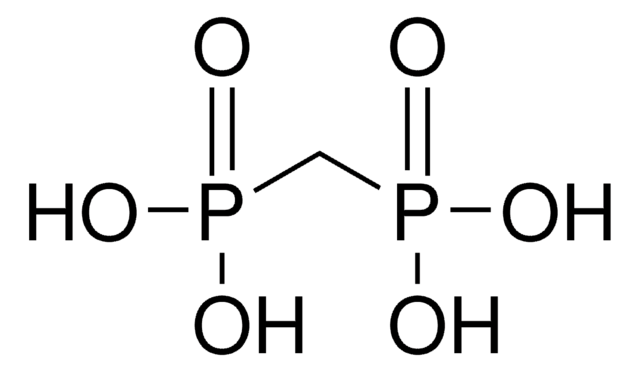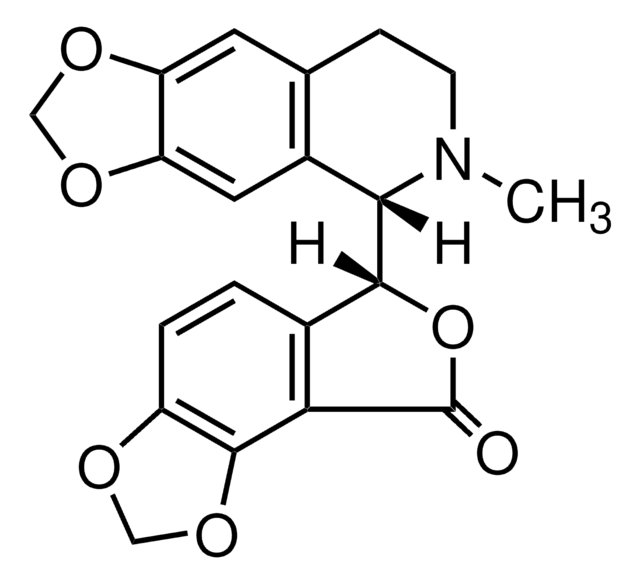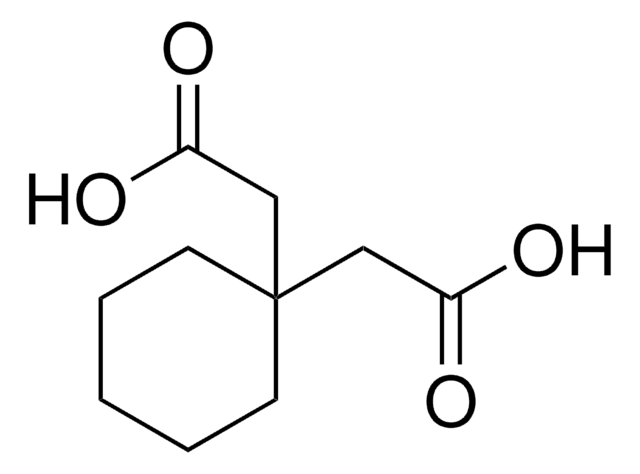추천 제품
분석
≥70.0% (degree of coupling)
solubility
DMF: 1 mg/mL, clear
형광
λex 583 nm; λem 605.0 nm±10 nm in PBS, pH 7
저장 온도
−20°C
일반 설명
Abberior STAR 580 is the latest development for STED microscopy with a fluorescent dye in the orange regime. The dye can be excited from 550 to 580 nm. Abberior STAR 580 can substitute dyes like Atto™ 590/594 or AlexaFluor 584/594. The dye can most effectively be depleted in STED microscopy at 700 to 780 nm via e.g. a Ti:Sa laser or IR diodes.
Abberior STAR 580 is the dye of choice for orange fluorescence. Moreover, the dye is particularly designed and tested for 2-color STED microscopy in combination with Abberior STAR 635 using 2 separate STED wavelength. This offers the great advantage of using 2 regular (not featuring a long Stokes-shift) dyes, which are in general more photostable. Please see our 2-color dye section
Key features
Absorption Maximum, λmax:: 587 nm (PBS, pH 7.4; water)
584 nm (MeOH, aq. ACN)
Extinction Coefficient, ε(λmax):85,000 M-1cm-1 (PBS, pH 7.4)
Correction Factor, CF260 = ε260/εmax: 0.17 (PBS, pH 7.4; water)
Correction Factor, CF280 = ε280/εmax: 0.15 (MeOH, aq. ACN)
Fluorescence Maximum, λfl:607 nm (PBS, pH 7.4)
604 nm (MeOH, aq. ACN)
Recommended STED Wavelength, λSTED:700 - 780 nm
Fluorescence Quantum Yield, η:0.90 (PBS, pH 7.4)
Fluorescence Lifetime, τ: 3.5 ns (PBS, pH 7.4)
Abberior STAR 580 is the dye of choice for orange fluorescence. Moreover, the dye is particularly designed and tested for 2-color STED microscopy in combination with Abberior STAR 635 using 2 separate STED wavelength. This offers the great advantage of using 2 regular (not featuring a long Stokes-shift) dyes, which are in general more photostable. Please see our 2-color dye section
Key features
- Exceptionally bright orange fluorescent dye
- Ideal for STED microscopy at 700-775 nm
- 2-color labeling partner with STAR 635P for 2-color STED microscopy
Absorption Maximum, λmax:: 587 nm (PBS, pH 7.4; water)
584 nm (MeOH, aq. ACN)
Extinction Coefficient, ε(λmax):85,000 M-1cm-1 (PBS, pH 7.4)
Correction Factor, CF260 = ε260/εmax: 0.17 (PBS, pH 7.4; water)
Correction Factor, CF280 = ε280/εmax: 0.15 (MeOH, aq. ACN)
Fluorescence Maximum, λfl:607 nm (PBS, pH 7.4)
604 nm (MeOH, aq. ACN)
Recommended STED Wavelength, λSTED:700 - 780 nm
Fluorescence Quantum Yield, η:0.90 (PBS, pH 7.4)
Fluorescence Lifetime, τ: 3.5 ns (PBS, pH 7.4)
애플리케이션
Anti-Mouse IgG-Abberior® STAR 580 antibody produced in goat has been used for STED (stimulated emission depletion) microscopy in CA3 (Cornus Ammonis) sections. Abberior® STAR 580 conjugated with secondary antibody has been used for dual-color STED imaging of cultured hippocampal neurons.
적합성
Designed and tested for fluorescent super-resolution microscopy
법적 정보
Atto is a trademark of Atto-Tec GmbH
abberior is a registered trademark of Abberior GmbH
Storage Class Code
11 - Combustible Solids
WGK
WGK 3
Flash Point (°F)
Not applicable
Flash Point (°C)
Not applicable
시험 성적서(COA)
제품의 로트/배치 번호를 입력하여 시험 성적서(COA)을 검색하십시오. 로트 및 배치 번호는 제품 라벨에 있는 ‘로트’ 또는 ‘배치’라는 용어 뒤에서 찾을 수 있습니다.
Daniela Ivanova et al.
The EMBO journal, 34(8), 1056-1077 (2015-02-06)
Persistent experience-driven adaptation of brain function is associated with alterations in gene expression patterns, resulting in structural and functional neuronal remodeling. How synaptic activity-in particular presynaptic performance-is coupled to gene expression in nucleus remains incompletely understood. Here, we report on
Pawel Fidzinski et al.
Nature communications, 6, 6254-6254 (2015-02-05)
KCNQ2 (Kv7.2) and KCNQ3 (Kv7.3) K(+) channels dampen neuronal excitability and their functional impairment may lead to epilepsy. Less is known about KCNQ5 (Kv7.5), which also displays wide expression in the brain. Here we show an unexpected role of KCNQ5
S W Hell et al.
Optics letters, 19(11), 780-782 (1994-06-01)
We propose a new type of scanning fluorescence microscope capable of resolving 35 nm in the far field. We overcome the diffraction resolution limit by employing stimulated emission to inhibit the fluorescence process in the outer regions of the excitation
Marcus Dyba et al.
Nature biotechnology, 21(11), 1303-1304 (2003-10-21)
We report immunofluorescence imaging with a spatial resolution well beyond the diffraction limit. An axial resolution of approximately 50 nm, corresponding to 1/16 of the irradiation wavelength of 793 nm, is achieved by stimulated emission depletion through opposing lenses. We
Tim Grotjohann et al.
Nature, 478(7368), 204-208 (2011-09-13)
Lens-based optical microscopy failed to discern fluorescent features closer than 200 nm for decades, but the recent breaking of the diffraction resolution barrier by sequentially switching the fluorescence capability of adjacent features on and off is making nanoscale imaging routine. Reported
자사의 과학자팀은 생명 과학, 재료 과학, 화학 합성, 크로마토그래피, 분석 및 기타 많은 영역을 포함한 모든 과학 분야에 경험이 있습니다..
고객지원팀으로 연락바랍니다.






